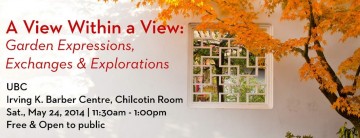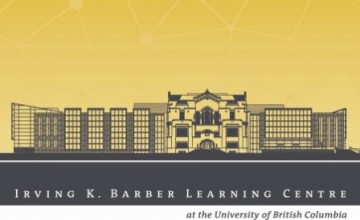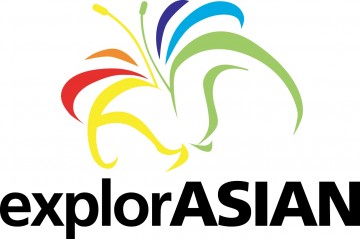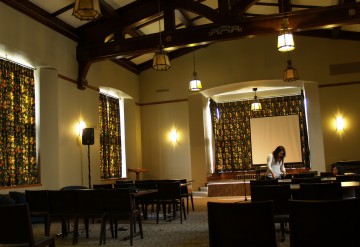 #librarycampUBC Camp is coming!
#librarycampUBC Camp is coming!
#librarycampUBC Camp is coming!
Remote Community Based Learning Fund 2014/2015 Submissions Now Open!
Remote Community Based Learning Fund Details
Remote Community Based Learning Fund
From planning a sustainable forest to researching fencing for pigs: The Remote Community Based Learning Fund provides students with the opportunity to work with organizations in remote communities and tackle complex challenges.
The Remote Community Based Learning Fund (RCBLF) is a joint initiative of the Irving K. Barber Learning Centre and the Centre for Community Engaged Learning. The RCBLF enables students to work with organizations in remote communities by covering workshop fees, travel and accommodation costs and much more.
Through remote community based experiential learning (CBEL) experiences, students gain discipline-specific knowledge and skills and learn about community priorities outside of urban centres, while testing their own assumptions and developing teamwork and communication skills.
Apply Now
If you’re a UBC faculty member interested in creating a remote CBEL opportunity for your students, we encourage you to apply. Funding is intended to support collaboration between UBC students and organizations located in BC communities outside of the Lower Mainland.
Learn more
[TAB] FEATURED PROJECTS
FEATURED PROJECTS:
TITLE
BLURB
3 STORY EXAMPLES (TITLE, PARAGRAPH, PICTURE)
Other initiatives in cooperation with the Centre for Community Engaged Learning:
Tipsheet for community organizations: Navigate the Library System
Learning Initiatives for Rural and Northern BC: 2014 – Apply Now!
Learning Initiatives for Rural and Northern BC (LIRN BC) is a collaborative approach to building on the capacities of rural, remote and Northern British Columbian communities. The Irving K. Barber Learning Centre is proud to partner with government and non-government organizations to provide and facilitate workshops to promote community learning and collaboration in rural and northern communities.
The LIRN BC process encourages local government, provincial, federal, First Nations, non-government organizations (community-based, regional and provincial) and businesses to work together to plan, deliver and evaluate a locally relevant learning initiative.
LIRN BC can bring trainers and facilitators to your community to deliver a learning event for residents. The 2014 Expression of Interest (EOI) includes workshop summaries for 24 workshops offered by LIRN BC partner organizations. Select the topic of the event from the choices offered and tell us why this is important in the form below. If your community is selected, you will be contacted by a LIRN BC partner who will work with you to design and deliver a learning event that meets the needs of your community. Successful applicants would be expected to provide publicity support, venue and refreshments.
►The EOI must be received by June 27th, 2014.
The LIRN BC partners are:
- Association of Neighbourhood Houses of BC
- BC Healthy Communities (PlanH Program)
- Fraser Basin Council (Integrated Community Sustainability Planning)
- Irving K. Barber Learning Centre UBC
- Leave Out Violence (LoVE)
- PeerNetBC
- StepUp BC
- SPARC BC
- Vantage Point
- YouthCo
EOI Details:
►The EOI must be received by June 27th, 2014. Please do not exceed the provided space of the Application Section of the EOI. Follow this link for more information or to download the EOI form.
►Return the Application Section only – pages 17 to 23 of this document – as a Word document by email to jsands@sparc.bc.ca | Jim Sands, Project Coordinator, SPARC BC (Social Planning and Research Council of BC).
►Special Instructions: Please do not exceed the provided space of the Application Section of the EOI. Return the Application Section only – pages 17 to 23 of this document – as a Word document by email to jsands@sparc.bc.ca.
►LIRN BC does not provide direct funding or cash. The support offered by LIRN BC generally includes: event planning, workshop and/or dialogue design, facilitation, training, and reporting services that are related to each learning event. The community (through a local steering committee) is expected to help with planning, marketing, providing a venue, and providing catering if needed (this can be through charging admission).
Note: If you have any questions please contact Jim Sands at 604-718-8504 or jsands@sparc.bc.ca
Aboriginal Unhistory Month 2014 at UBC Library
The University of British Columbia Point Grey campus is located on the traditional, ancestral, and unceded territory of the hən̓q̓əmin̓əm̓speaking Musqueam people. We thank Musqueam for its hospitality and support of our work.
UBC Library, in partnership with the Musqueam Indian Band, the Centre for Teaching and Learning Technology and the Museum of Anthropology, will be celebrating Aboriginal scholarship, creativity, and intellectual traditions with its third annual Aboriginal (Un)History Month.
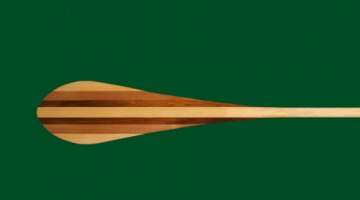
Paddle created by Keith Point, of the Skowkale First Nation in Chilliwack, who also descends from the Musqueam First Nation.
.
Featuring exhibits at the Irving K. Barber Learning Centre (IKBLC) and book displays at several library branches, the (Un)History month activities introduce ways UBC Indigenous scholars are creating relationships, educating and inviting dialogue about indigenous issues.
Since 2009, the month of June has been designated as ‘National Aboriginal History Month’ by the federal government of Canada. National Aboriginal Day is June 21 every year. UBC Library and the participating curators have been observing Aboriginal (Un)History Month since 2011. The exhibits and programs are meant to celebrate Aboriginal creativity, scholarship, and intellectual traditions; cultivate conversations about relationship, representation and recognition; and inspire participants to be better informed about the Aboriginal lands and peoples of whom we are guests.
This year’s theme is “Honouring our Journeys,” which celebrates journeys that have been emotional, spiritual, and educational; personal, community, and institutional; and historic, contemporary, or moment-in-time.
The exhibits at IKBLC foyer include:
- The Centre for Teaching, Learning and Technology – Our Time and Place at UBC: Reflecting on the TRC in 2013
- Ch’nook – Indigenous Business Education
- Decolonizing Knowledge – Knowing the Land Beneath Our Feet at UBC
- Musqueam Indian Band – mən̓ə to mana: xʷməθkʷəy̓əm (Musqueam) to Māori (Rotorua, New Zealand)
- The Museum of Anthropology – Claiming Space: Voices of Urban Aboriginal Youth
- Bruce Muir of West Moberly First Nations – Protecting Treaty Rights: the Klinse-Za Caribou Herd’s Journey Towards Recovery
For those interested in online resources,
- Aboriginal Business Education and Resources from the Small Business Accelerator program
- Aboriginal Law research guide
- Delgamuukw Resources guide – Aboriginal Land and Title case
- Delgamuukw Trial Transcripts
- Mungo Martin and UBC’s Early Totem Pole Collection
- həm̓ləsəm̓ House at UBC (Video)
- q̓ələχən House at UBC (Video)
Partners this year include: Musqueam Indian Band, Bruce Muir of West Moberly First Nations, the Centre for Teaching, Learning and Technology at UBC, Ch’nook Indigenous Business Education, the Irving K Barber Learning Centre, the First Nations House of Learning, UBC Library Communications, UBC’s Education Library, the Museum of Anthropology at UBC and Xwi7xwa Library.
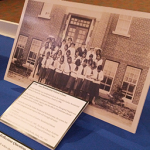
For more information, visit the IKBLC website or contact Sarah Dupont, Aboriginal Engagement Librarian.
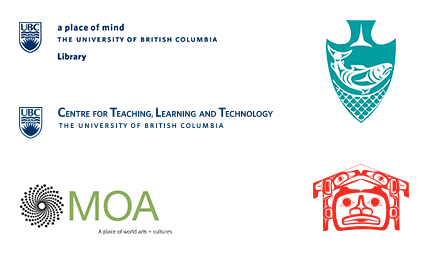
Margaret Scaia – Working Professionalism: Nursing in Calgary and Vancouver 1958 to 1977
On May 17, 2014, the Consortium and the BC History of Nursing Society co-hosted Dr. Margaret Scaia (University of Victoria) at the annual BC History of Nursing Society Luncheon. Dr. Scaia presented from her PhD dissertation work: Working Professionalism: Nursing in Calgary and Vancouver 1958 to 1977.
Changes in women’s relationship to caring labour, and changes in societal attitudes towards women as nurses during the period when they became union members and aspiring professionals, are revealed in thirty-seven oral history interviews with women who became nurses between 1958, a pivotal time in the development of the publicly funded health care system, and 1977, when the last residential school of nursing closed in Calgary. This study challenges the historiography that suggests that nursing education programs in the 1960s and early 1970s were sites of unusual social regulation, and that nursing was a career choice that women made because of the lack of other more challenging or rewarding alternatives. In making these claims
Dr. Scaia positions nursing and nursing education, instead, as a form of women’s labour that exemplified employed women’s struggles to promote fairer wages, better working conditions, and as an educational opportunity that opened unusual and largely unavailable opportunities for access to higher education for women and career advancement.
This challenge to the prevailing historiography of nursing and nursing education during this period establishes the main thesis of her presentation, based on my recently completed doctoral dissertation. Dr. Scaia acknowledges her supervisors Dr. ME Purkis, Dr. L. Marks, & Dr. A. Lepp, and funding support from SSHRC Bombardier Scholarship. This talk was held at the Vancouver Lawn Tennis & Badminton Club.
Selected Works Available at UBC
Scaia, M. and McPherson, K. Challenges and change in undergraduate nursing education. In M. McIntyre and C. McDonald (Eds.). Realities of Canadian Nursing: Professional, Practice and Power Issues (3rd edition, pp.183-202). (New York NY: Lippincott Williams and Wilkins, 2010 and 2013). [Link]
Boschma, G., Scaia, M., Bonifacio, N. and Roberts, E., Oral history research. In S.B. Lewenson and E.K. Herrmann (Eds.). Capturing Nursing History: A Guide to Historical Methods in Research (pp.79-98). (New York NY: Springer Publishing Company, 2008). [Link]
Scaia, Margaret. Understanding the experience of adolescent motherhood, 1939-2001. (Ottawa: National Library of Canada, Bibliothèque nationale du Canada, 2004). [Link]
UBC Library Research Guides
Leo Shin – China and its Minorities: A Historical Perspective
As China seeks to position itself as a reasonable power on the world stage, it must recognize the needs and aspirations of the multitude of “minority nationalities” within its territories. In this talk, Dr. Leo Shin will examine some of the “minority problems” China is encountering and situate them within a broader historical context. As a cultural historian of later imperial China, Professor Shin offers courses on Chinese and world history. Visitors are encouraged to learn more about his research and teaching as well as to explore the wider world of history and China resources.
Speaker Bio
Leo K. Shin is a cultural historian specializing in later imperial China. His research interest lies in the relationship between culture, identity, and historical memory. In his reading and writing, he seeks to understand in particular how the sociology of culture—the production, transmission, and consumption of beliefs and practices—has shaped not only how the boundaries of China have been drawn but also how China itself has been historicized. His current book project, The Uses of a Chinese Martyr, is a study of the memories of Yue Fei (1103–1142), the famous Song-dynasty general who was ordered to death by the emperor but who has since been transformed into the premier symbol of loyalism and patriotism in Chinese societies. The study examines the history of this transformation and explores what it may reveal about the relationship between culture, identity, and memory in later imperial China.
UBC Library Resources
Shin, Leo K. The Making of the Chinese State: Ethnicity and Expansion on the Ming Borderlands. (Cambridge: Cambridge University Press, 2006). [Available at Walter C. Koerner Library]
Shin, Leo K. “Thinking about ‘Non-Chinese’ in Ming China.” Forthcoming in Antiquarianism and Intellectual Life in Europe and China, 1500-1800, ed. Peter Miller and François Louis. [Link]
Shin, Leo K. “The Nation and Its Logic in Early Twentieth-Century China.”Journal of the Canadian Historical Association 18.2 (2007): 104-122. [Link]
Shin, Leo K. “Ming China and Its Border with Annam.” In Chinese State at the Borders, ed. Diana Lary, 91-104. Vancouver: University of British Columbia Press, 2007. [Link]
Shin, Leo K. “The last campaigns of Wang Yangming.” T ‘oung Pao (2006): 92-1. [Link]
A View Within a View: Garden Expressions, Exchanges & Explorations
During Asian Heritage Month, visitors of the Irving K. Barber Centre will have the opportunity to the experience the history, culture and symbolism of the Classical Chinese Garden in a series of specially-curated and thematic display cases.
As part of the month-long exhibition, the Dr. Sun Yat-sen Classical Chinese Garden and the Irving K. Barber Learning Centre present a public presentation “A View Within a View: Garden Expressions,
Exchanges & Explorations” on Saturday May 24th, 2014 – 11:30am-1:00pm at the Chilcotin Room (Rm 256) in the Irving K. Barber Learning Centre.
A moderated presentation will be hosted for collaborated garden conversations with the UBC Botanical Garden and Nitobe Japanese Garden. Join us on UBC Alumni Weekend to listen to speakers in lively talks about these built spaces of nature and the role they play in our contemporary urban contexts. All are welcome, the event is free. For more information, contact Allan Cho, Community Engagement Librarian, or Susan Ma, Director of Educational Programming at Dr. Sun Yat-Sen Classical Chinese Garden or 604-662-3207 ext. 205.
Speakers
Kathy Gibler – Executive Director since 2006, Kathy Gibler has been an integral part of the Dr Sun Yat-Sen Garden Society for 14 years. Prior to becoming Executive Director, she was on the Board of Trustees for seven years. As Board President, Kathy guided the Garden through a major expansion from 2002 to 2004, and previously served with the Garden as a docent, tour guide, and president of volunteers.
Douglas Justice – Along with duties as the Associate Director and Curator of Collections at UBC Botanical Garden, Douglas also teaches in both the Applied Biology and Masters of Landscape Architecture programs at UBC and is involved with public and industry extension. A former nursery manager, gardener and horticulture instructor, Douglas holds a Bachelor’s degree in horticulture and a Master’s in botany. He is an active member of a number of local, national and international plant and garden organizations and is currently writing a book on trees for the Vancouver area.
Ryo Sugiyama – Ryo is the Curator of Nitobe Memorial Garden at UBC.
